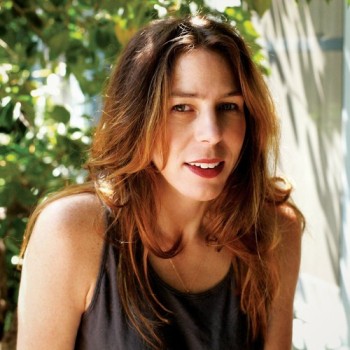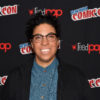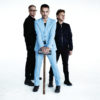“The Flamethrowers,” a new novel from Rachel Kushner, is gathering up acclaim. The intricately-woven story follows a young conceptual artist who gets caught up in the art scene of 1970s New York, the Italian anarchist movement, and a love of motorcycles, so it might be a bit difficult to parse in casual party chit-chat. Luckily, the author sat down with Brendan to talk it out, so you’ll be the savviest person in the room.

Brendan Francis Newnam: The problem with “The Flame Throwers” is, it’s the kind of book you want to talk about, but it’s so dense that it’s not easy. So, let me try and summarize it?
Rachel Kushner: Okay.
Brendan Francis Newnam: All right, so, this book is about a young conceptual artist named Reno who moves from her home state of Nevada to New York City in the 70’s, where she starts dating a wealthy older Italian artist. And through him and her love of motorcycles and speed, she becomes entwined, not only in the art world in the 70’s of New York, but the Italian anarchist movement in Rome. How’s that so far?
Rachel Kushner: I think that’s a good description. It is a hard thing to encapsulate, the narrative arc, and the different thematic components of this book, so thank you for doing it for me.
I would just say, she’s never named, but she’s referred to kind of sarcastically as Reno by a character to whom she’s drawn. And he says it kind of to tease her, because she’s form this provincial city in Nevada. But she is actually unnamed.
Brendan Francis Newnam: We don’t know her name, yeah. I feel like it gives her some street cred that she’s from Nevada, but was I misreading?
Rachel Kushner: No, I think that’s probably exactly right, but it’s both. It means they’re kind of tagging her as being from a smaller town.
But it also happens to be the case that Nevada, New Mexico, Utah, certain parts of California, were the locale for the land artist to make their work in the west. She says at one point, that you have to move to New York City in order to move west and do these kind of conceptual art projects.
Brendan Francis Newnam: You moved to New York City and returned out west. Was that necessary to become a kind of a hot young author, do you think?
Rachel Kushner: Well, I did live in New York City, and I am from the West. That said, moving to New York, yeah, it was a useful education for me, but I don’t know if it was the same in the sense of being a writer. I think you don’t have to be from New York to understand the conversation, if you will, that takes place among writers and in history, in regard to literature.
I met a lot of artists when I moved to New York, and I think that that probably informed the writing of this book. The personalities that I encountered, and a certain swiftness and sense of humor that I’m attracted to, and I think which helped me form the characters of the book.
Brendan Francis Newnam: A lot of the book takes place in the 70’s art world. It also takes place in World War I era Italy. It also goes into great detail about motorcycles, the manufacture thereof. Also, rubber plantations in Brazil.
That’s a lot of work. I’m just thinking from a practical standpoint as a writer, how do you set about doing the research for that?
Rachel Kushner: You know, it’s funny, when you were enumerating those things, I guess they do sound sort of disparate and even a little dissonant, but I was thinking, what a lucky person I am, because those are all things that came up for me as interests as I was writing the book.
I was interested in Futurism, and I was interested in history of industry. I’ve always been interested in speed and machines and technology and racing, cars, motorcycles, I used to ride motorcycles, so that’s something that I know about in a natural and kind of organic way, and I didn’t have to research.
Brendan Francis Newnam: So this book does follow the art world, and there are cocktail parties with artists, and fun stuff like that, but it also bristles with social unrest. It’s about action in the streets, not just on the canvas.
Can you tell us about what was going on in Italy and America around then?
Rachel Kushner: Well, revolt and insurrection are themes. And what happens when a lot of people decide at the same time that they’re going to participate in a kind of illegality, and that happens in the book, as it did in real life, in New York City during the blackout of 1977, in July of that summer.
And it also happens in the book, in Italy, on March 12th of 1977. That was a kind of crucial moment. The day before, someone had been killed in Bologna, and all of these people who were part of what was called the Autonomous Movement, descended upon Rome, and there were 100,000 people in the streets, and the police tear gassed everybody, et cetera. A lot of things happened.
Brendan Francis Newnam: Why this book right now? It does feel part of the Zeitgeist a little bit, and I’m wondering, have you given any thought to that? To why this seed started to germinate in this time for you?
Rachel Kushner: Yeah, I don’t know. I’m glad you said it’s part of the Zeitgeist. I didn’t know if you were gonna say it is, or feels a little out of step with that.
I mean, I could claim that I had prognosticated Occupy and the riots in Greece, and the anti-austerity movements, and the Arab Spring. I could say on the other hand that it was just pure luck that I wrote a book that has to do with insurrection and then that we’ve experienced a series of political tumults and turmoils in this world, but I think maybe neither answer is correct.
The first one is dishonest, I didn’t prognosticate all of these things, but the second is maybe woefully naive, because writers ideally are sensitive to what’s going on around them.
There’s a chapter in the book about this anarchist street gang, and I read that in LA, and a lot of my friends were there, people who were involved in the Occupy Movement. The people who came to that reading thought that it was about them. But when I wrote it, I wasn’t thinking of them. It’s just one of those things that happens.
Brendan Francis Newnam: Rachel Kushner, thanks so much for coming by.
Rachel Kushner: Thank you for having me.


